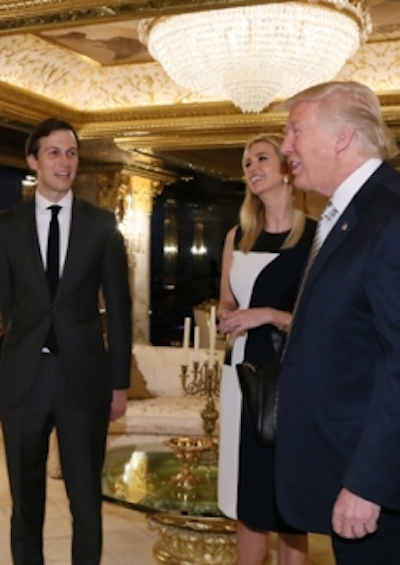Trump, the Great American Traditionalist
Close family ties were a way of life in early American presidential politics.
April 11, 2017

Who would have known that Donald Trump, the supposed flamethrower, firebrand and tearer-downer of all the good traditions of American politics, is really driven by … tradition.
As a matter of fact, Mr. Trump can be said to be keen on resurrecting key structures of the early American Republic.
There were those who were taken aback when, for example, German Chancellor Angela Merkel and President Trump had a meeting recently with various multinational CEOs, including with the CEOs of IBM and Dow Chemical on the US side.
Two seats down from Trump on the U.S. side sat Trump’s son-in-law Jared Kushner, while right across from him – and next to Angela Merkel — sat Trump’s daughter Ivanka.
Yes, some people have complained that Donald Trump shows blatant disregard for nepostism laws that are designed to keep government-paid positions from unfairly going to spouses, siblings and children.
But for a man as mercurial and temperamental as Mr. Trump has proven to be, having key members of his family close by may actually stabilize his presidency, rather than tore it asunder.
Irrespective of one’s political preferences and party affiliations, one point is irrefutable. It represents a return to the roots of the republic!
Resurrecting tradition
In the late 18th and early 19th century political sphere, many political leaders were working closely with relatives. For that reason, his reliance on daughter Ivanka and son-in-law Jared represents no stark departure from American political tradition, but actually a return to it.
Because the “founders” were limited to a narrow, landed elite from the original 13 states (and a few of the new states split off from those), almost everyone – or so it seemed — was related to very large family networks by blood or marriage.
These families represented ties that underscored the essence of American political “nobility” (in the aristocratic sense), as well as truly “familiar” ties, in the most literal sense.
The Adamses before the Trump/Kushners
There are so many examples upon which one could draw, but a few high-profile cases will do here.
- The second President of the United States, John Adams, not only maneuvered his son and future President (John Quincy Adams) into key positions in various administrations, but he was also a cousin of Sam Adams, the outgoing Governor of Massachusetts.
- George Washington’s Treasury Secretary Alexander Hamilton was the son-in-law of New York Senator Philip Schuyler.
- James Madison, fourth President and fifth Secretary of State, was a cousin to 12th president Zachary Taylor. Both were Mayflower descendants, like many leading figures of the early American Republic.
- John Marshall, the trailblazing early U.S. Supreme Court Chief Justice, was cousin to a Kentucky Senator and uncle to a Kentucky Congressman. He was also related to Thomas Jefferson, and both Marshall and Jefferson were related to the early Virginia colonial figure William Randolph, who was – through his nine children – the forebear of many early American figures of note.
Family matters of the 1850s
Even as late as the 1850s, America was stunned when a South Carolina Congressman nearly beat to death a Massachusetts Senator for allegedly mocking the former’s second cousin, a Senator from South Carolina who had recently suffered a stroke, during a Senate speech.
In the still fledgling United States, all of this had much the same effect as the complex family and marital relationships that were the hallmark of how European nobility in that same era tried to preserve its power structure, across hundreds of minor principalities and numerous major powers.
Instead of trying to marry off the many sons and daughters of English dukes to the many sons and daughters of German dukes, the early American leadership, by necessity, were more homebound.
They married their many children off to the many children of other Senators, Governors, Congressmen, judges, state legislators and more.
And once secured in such alliances, these in-laws and cousins (or both!) could be recruited into various appointments. That way, one could not only ensure a loyal staff with matching interests, but also underscore and consolidate one’s machine patronage and civil service spoils.
Nepotism not just in politics
The nepotistic presence of closely interwoven, financially interested and familial parties is somewhat more startling in the United States of today. But it is certainly not restricted to the world of politics.
Just consider the proliferation into cushy media jobs of the sons and daughters of recent or current American presidents, governors and senators. Think of:
- President Bill Clinton’s (and Secretary of State Hillary Clinton’s) daughter Chelsea;
- the late New York Governor Mario Cuomo’s son Chris, who is also the brother to current Governor, Andrew Cuomo;
- Senator McCain’s daughter Meghan;
- Utah Governor Jon Huntsman’s daughter Abby;
- the entire Bush clan including President George W. Bush’s daughter Jenna and so on.
Even relatively minor figures like former Congressman Dennis Kucinich, who tend — as he did — to occupy the media roles themselves after leaving office, also see their children (such as his daughter Jackie) find media posts easily.
Still, that seems to be viewed much differently from how the public views hiring decisions for government posts. Back in an era of much less open access to the political space, much larger political families working together to rule their little fiefdoms was not seen as shocking in the way that it is today.
Despite the air of corruption around it all, it is always possible (however unlikely) that it will have the same primary effect as it arguably did in the early republic: Assembling stable governing teams that weren’t based on close familial bands and still proved capable of enacting an agenda based on aligned self-interest.
Takeaways
Trump's reliance on Ivanka and Jared represents not a departure from American political tradition but a return to it.
The nepotistic presence of closely interwoven, financially interested and familial parties is more startling today.
Nepotism is not restricted to politics. Consider the proliferation into cushy media jobs of the children of American govt. officials.

